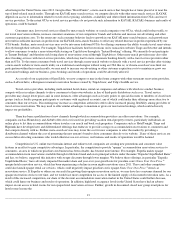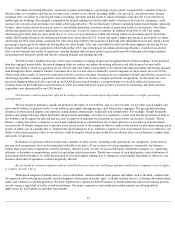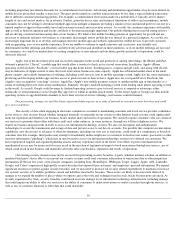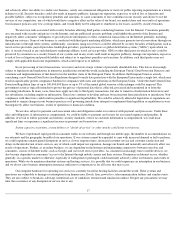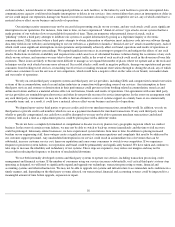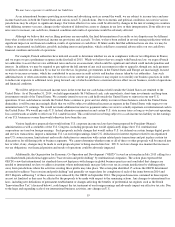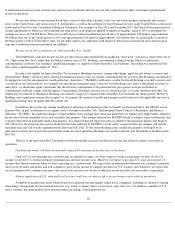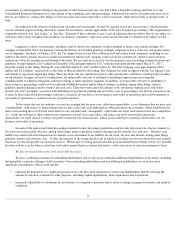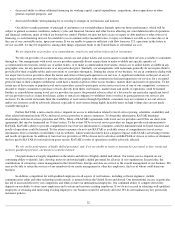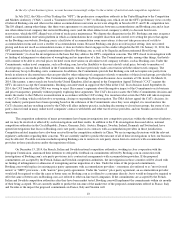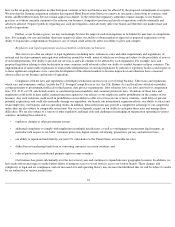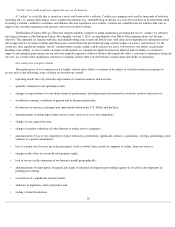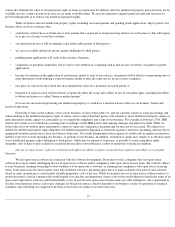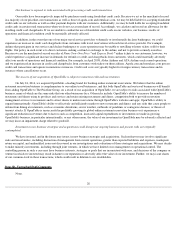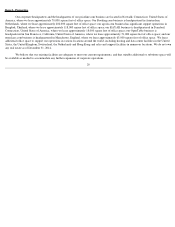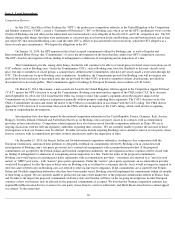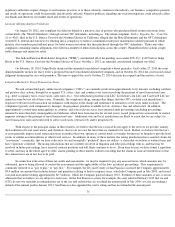Priceline 2014 Annual Report Download - page 27
Download and view the complete annual report
Please find page 27 of the 2014 Priceline annual report below. You can navigate through the pages in the report by either clicking on the pages listed below, or by using the keyword search tool below to find specific information within the annual report.
As the size of our business grows, we may become increasingly subject to the scrutiny of anti-trust and competition regulators.
In July 2012, the Office of Fair Trading (the "OFT"), the predecessor competition authority in the United Kingdom to the Competition
and Markets Authority ("CMA"), issued a "Statement of Objections" ("SO") to Booking.com, which set out the OFT's preliminary views on why
it believed Booking.com and others in the online accommodation reservation sector were allegedly in breach of E.U. and U.K. competition law.
The SO alleged, among other things, that there were agreements or concerted practices between accommodations and Booking.com and at least
one other online travel company that restricted Booking.com's (and the other online travel company's) ability to discount hotel room
reservations, which the OFT alleged was a form of resale price maintenance. We dispute the allegations in the SO. Booking.com runs an agency
model accommodation reservation platform in which accommodations have complete discretion and control over setting the prices that appear
on the Booking.com website. Booking.com is a facilitator of accommodation room reservations; it does not take possession of or title to
accommodation rooms and is not a reseller of accommodation rooms. Because Booking.com plays no role in price setting, does not control
pricing and does not resell accommodation rooms, it does not believe that it engages in the conduct alleged in the SO. On January 31, 2014, the
OFT announced that it had accepted commitments offered by Booking.com, as well as by Expedia and Intercontinental Hotel Group,
("Commitments") to close the investigation on the basis that they address the OFT's competition concerns. The OFT closed its investigation with
no finding of infringement or admission of wrongdoing and no imposition of a fine. The Commitments provide, among other things, that hotels
will continue to be able to set retail prices for hotel room reservations on all online travel company websites, such as Booking.com. Under the
Commitments, online travel companies, such as Booking.com, have the flexibility to discount a hotel's retail price, but only to members of
closed groups, a concept that is defined in the Commitments, who have previously made a reservation with the online travel company. The
discount may be up to Booking.com's commission. In addition, the Commitments provide that Booking.com will not require rate parity from
hotels in relation to discounted rates that are provided by other online travel companies or hotels to members of their closed groups, provided the
discounted rate is not made public. The Commitments apply to bookings by European Economic Area residents at U.K. hotels. On March 31,
2014, Skyscanner, a meta-search site based in the United Kingdom, filed an appeal in the Competition Appeal Tribunal ("CAT") against the
OFT's decision to accept the Commitments. Booking.com intervened in support of the CMA in the CAT. In its decision dated September 26,
2014, the CAT found that the CMA was wrong to reject Skyscanner's arguments about the negative impact of the Commitments on its business
and price transparency generally without properly exploring these arguments. The CAT's decision vacates the CMA's Commitments decision and
remits the matter to the CMA for reconsideration in accordance with the CAT's ruling. It is uncertain what action the CMA will take in response
to the CAT's ruling, which could involve re-opening, closing or suspending the investigation. The CMA did not appeal the CAT's decision. As
many industry participants have been operating based on the substance of the Commitments since they were adopted, it is uncertain how the
CAT's decision and any resulting action by the CMA will affect industry practice, including discounting to closed user groups, the status of rate
parity clauses found in many online travel companies' contracts with hotels and other travel service providers, and our business and results of
operations.
The competition authorities of many governments have begun investigations into competitive practices within the online travel industry,
and we may be involved or affected by such investigations and their results. In addition to the U.K. investigation discussed above, national
competition authorities in the Czech Republic, France, Germany, Italy, Austria, Hungary, Sweden, Ireland, Denmark and Switzerland, have
opened investigations that focus on Booking.com's rate parity clause in its contracts with accommodation providers in those jurisdictions.
Competition related inquiries have also been received from the competition authority in China. We are in ongoing discussions with the relevant
regulatory authorities regarding their concerns. We are currently unable to predict the outcome of all of these investigations or how our business
may be affected. Possible outcomes include requiring Booking.com to remove its rate parity clause from its contracts with accommodation
providers in those jurisdictions and/or the imposition of fines.
On December 15, 2014, the French, Italian and Swedish national competition authorities, working in close cooperation with the
European Commission, announced their intention to seek public feedback on commitments offered by Booking.com in connection with
investigations of Booking.com's rate parity provisions in its contractual arrangements with accommodation providers. If the proposed
commitments are accepted by the French, Italian and Swedish competition authorities, the investigations in those countries will be closed with
no finding of infringement or admission of wrongdoing and no imposition of a fine. Under the terms of the proposed commitments,
Booking.com would replace its existing price parity agreements with accommodation providers - sometimes also referred to as "most favored
nation" or "MFN" provisions - with "narrow" price parity agreements. Under the "narrow" price parity agreement, an accommodation provider
would still be required to offer the same or better rates on Booking.com as it offered to a consumer directly, but it would no longer be required to
offer the same or better rates on Booking.com as it offered to other on-line travel companies. If the commitments are accepted by the French,
Italian and Swedish competition authorities after they have been market tested, Booking.com will implement the commitments within six months
of their being accepted. We are currently unable to predict the outcome of the market test of the proposed commitments offered in France, Italy
and Sweden or the impact the proposed commitments in France, Italy and Sweden will
23


